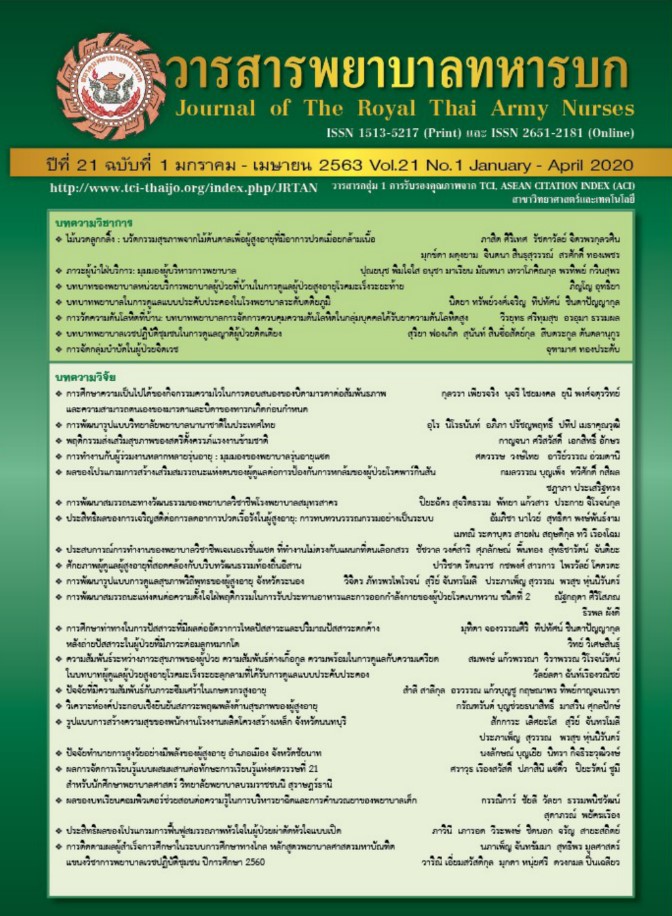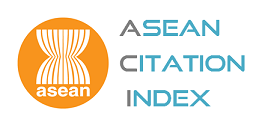ศักยภาพผู้ดูแลผู้สูงอายุที่สอดคล้องกับบริบทวัฒนธรรมท้องถิ่นอีสาน
คำสำคัญ:
ศักยภาพ, ผู้ดูแลผู้สูงอายุ, บริบทอีสานบทคัดย่อ
การวิจัยครั้งนี้เป็นการวิจัยเชิงบรรยาย (Descriptive research) มีวัตถุประสงค์เพื่อศึกษา 1) ศักยภาพผู้ดูแลผู้สูงอายุ ตามบริบทวัฒนธรรมท้องถิ่นอีสาน 2) เปรียบเทียบศักยภาพผู้ดูแลผู้สูงอายุ ในเขตอำเภอเมืองและนอกเขตอำเภอเมืองอุบลราชธานี และ 3) บทบาทของพยาบาลวิชาชีพในการส่งเสริมศักยภาพของผู้ดูแลผู้สูงอายุ กลุ่มตัวอย่างที่ศึกษา 1) ผู้ดูแลผู้สูงอายุ จำนวน 210 คน และ สัมภาษณ์เชิงลึก 5 คน 2) พยาบาลวิชาชีพที่รับผิดชอบ งานผู้สูงอายุ สัมภาษณ์เชิงลึกจำนวน 5 คน สุ่มตัวอย่างผู้ดูแลผู้สูงอายุแบบหลายขั้นตอน (Multi-stage sampling) เครื่องมือที่ใช้ ในการวิจัยเป็นแบบสอบถามมาตราประเมินค่า และแบบสัมภาษณ์เชิงลึก ผ่านการตรวจสอบความตรงตามเนื้อหาจากผู้ทรงคุณวุฒิ วิเคราะห์ค่าความเที่ยงแบบสอบถามศักยภาพผู้ดูแลผู้สูงอายุ เท่ากับ 0.90 วิเคราะห์ข้อมูลด้วยสถิติแจกแจงความถี่ ร้อยละ ค่าเฉลี่ย ส่วนเบี่ยงเบนมาตรฐาน และสถิติทดสอบความแตกต่างของค่าเฉลี่ย Independent t-test ส่วนข้อมูลเชิงคุณภาพวิเคราะห์เชิง เนื้อหา
ผลการวิจัยพบว่า 1) ศักยภาพผู้ดูแลผู้สูงอายุ ในเขตอำเภอเมืองและนอกเขตอำเภอเมือง อยู่ในระดับสูง ( = 4.05 และ 4.09 ตามลำดับ) 2) ศักยภาพผู้ดูแลผู้สูงอายุในเขตอำเภอเมืองและนอกเขตอำเภอเมือง แตกต่างกันอย่างไม่มีนัยสำคัญทางสถิติ 3) เปรียบเทียบความแตกต่างรายด้านของศักยภาพผู้ดูแลผู้สูงอายุ ระหว่างผู้ดูแลผู้สูงอายุในเขตอำเภอเมืองและนอกเขตอำเภอเมือง พบว่า ศักยภาพการดูแลด้านจิตใจ ด้านสังคมและการดูแลด้านเศรษฐกิจของผู้ดูแลผู้สูงอายุในเขตอำเภอเมืองและนอกเขตอำเภอ เมือง มีความแตกต่างอย่างมีนัยสำคัญทางสถิติที่ระดับ .05 (t = -2.03, -3.12 และ 3.22 ตามลำดับ) 4) พยาบาลวิชาชีพมีบทบาท ให้ความรู้กับผู้ดูแลผู้สูงอายุเป็นรายบุคคล เกี่ยวกับวิธีการดูแลผู้สูงอายุ มากกว่าบทบาทการส่งเสริมทัศนคติและบทบาทดูแล ด้านร่างกายและจิตใจของผู้ดูแล จากผลการวิจัยจะเห็นได้ว่า ผู้ดูแลในเขตอำเภอเมืองและนอกเขตอำเภอเมืองมีศักยภาพในการดูแลผู้สูงอายุ ดังนั้นบุคลากร สุขภาพโดยเฉพาะพยาบาลวิชาชีพควรมีบทบาทในการส่งเสริมความรู้และทักษะเกี่ยวกับการดูแลสุขภาพเพื่อให้ผู้ดูแลดำรงไว้ ซึ่งศักยภาพในการดูแลผู้สูงอายุต่อไป และควรส่งเสริมทัศนคติและดูแลร่างกายและจิตใจของผู้ดูแล
Downloads
เอกสารอ้างอิง
Revision, Key Findings and Advance Tables. Working Paper No. ESA/P/WP/248. New York:United Nations 2017
2. Prasartkul P. Situation of The Thai Elderly 2014. Bankok: Amarin Printing & Publishing Public Company Limited 2014; (in Thai)
3. Pothinam S., Saensak P., Poonsawat J., and Other. Thai-Elderly; Mahasarakam Province Context. Journal of Srinagarind Medical Journal 2009;
24(3): 197 - 205. (in Thai)
4. Onsri P., Urailert A. The Role of the Nurses in Elderly Health Promotion. Journal of The Royal Thai Army Nurses 2018; 19(2): 55 - 62
(in Thai)
5. Phopa Y., Sanveingchan S. and Pruksacheva T. Factors Effecting Health Promotion Behavior in Elderly: In-Depth Factors Study in Ban
Khlong Yong Moo 1. Journal of The Royal Thai Army Nurses 2017; 18 (Supplement): 266 - 275. (in Thai)
6. Wangkheeree S. Care Giver Roles for Elderly People in Phisanulok. Master of Arts Thesis. Development Strategy. Phibun Songkhram
Rajabhat University. Phitsanulok, 2009. (in Thai)
7. Katewongsa P. Living Arrangement and The Well-Being of Rural Households in Thailand. Thai Population Journal 2017: 5 (1) : 107 – 130.
(in Thai)
8. Phadungyam M., Duvall A C. Rehabilitation Strategies for Resilience Quotient in the Elderly. Journal of The Royal Thai Army Nurses 2018; 19 (1): 66-73. (in Thai)
9. Winitsorn N., Tangchitmeti P., Yuenyong N., Panbun S. The Development of Chronic Care Model for Urban Older Adults by Community
Participation: A Case Study of Bangkhayaeng Community. Journal of Nursing and Education 2015; 8 (3): 14-32. (in Thai)
10. Eamsamai S., Mhuansit R., Thongmag C. An Elderly Care Model among Caregiving Volunteers at Phukrang Municipality, Amphur
Praputthabat, Saraburi Province. Nursing Journal of the Ministry of Public Health 2013;22(3): 77-87 (in Thai)
11. Doungchan N., Wirojratana V., Jitramontree N. Correlation between the Quality of Life of Stroke Patients’ Caregivers and Basic Factors,
Mutuality and Rewards of Caregiving. Thai Journal of Nursing Council 2017; 32 (7): 65–78. (in Thai)
12. Yotphet S. Care system and manpower for elderly care. Bangkok, 2008. (in Thai)
ดาวน์โหลด
เผยแพร่แล้ว
รูปแบบการอ้างอิง
ฉบับ
ประเภทบทความ
สัญญาอนุญาต
บทความหรือข้อคิดเห็นใดใดที่ปรากฏในวารสารพยาบาลทหารบกเป็นวรรณกรรมของผู้เขียน ซึ่งบรรณาธิการหรือสมาคมพยาบาลทหารบก ไม่จำเป็นต้องเห็นด้วย
บทความที่ได้รับการตีพิมพ์เป็นลิขสิทธิ์ของวารสารพยาบาลทหารบก
The ideas and opinions expressed in the Journal of The Royal Thai Army Nurses are those of the authors and not necessarily those
of the editor or Royal Thai Army Nurses Association.







